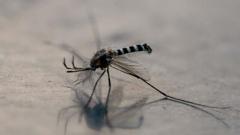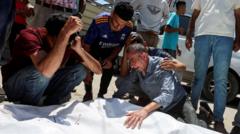The Colombian government has taken urgent measures due to a severe yellow fever outbreak, prompting a nationwide health emergency declaration.
Colombia Faces Health Crisis Amid Yellow Fever Outbreak

Colombia Faces Health Crisis Amid Yellow Fever Outbreak
Colombian government declares health emergency as yellow fever claims 34 lives nationwide.
In response to a deadly yellow fever outbreak that has resulted in at least 34 fatalities, Colombia's government has declared a nationwide health emergency. Official reports indicate that during this alarming outbreak, there have been 74 confirmed cases of yellow fever in the country. The disease is transmitted through mosquitoes and can be effectively prevented with a vaccine, which, notably, is provided free of charge in Colombia.
Health Minister Guillermo Alfonso Jaramillo has emphasized the importance of vaccination, particularly as the Easter weekend approaches, when many Colombians travel to regions where the mosquito population poses a higher risk. To adapt to this situation, the government has mandated that individuals traveling to high-risk areas must provide proof of vaccination against yellow fever. This outbreak is particularly concerning because it has a mortality rate of nearly 50% among those infected, which is significantly higher than previous years, with only two reported cases in 2023 and none from 2019 to 2022.
The eastern region of Tolima province has seen a clustering of cases, a popular area known for its coffee plantations and scenic views that attract both local and international tourists. President Gustavo Petro has cautioned citizens on social media, urging those who have not received their vaccinations to avoid high-risk zones, particularly the coffee-producing areas.
Diagnosis can be challenging since yellow fever shares symptoms with other illnesses. Initially, patients may experience fever, muscle pain, headaches, and loss of appetite, but about 15% may enter a dangerous second phase characterized by high fever and jaundice, leading to complications such as bleeding and kidney failure. Without timely intervention, around half of those who progress to this toxic phase may not survive, according to World Health Organization data.
Health Minister Guillermo Alfonso Jaramillo has emphasized the importance of vaccination, particularly as the Easter weekend approaches, when many Colombians travel to regions where the mosquito population poses a higher risk. To adapt to this situation, the government has mandated that individuals traveling to high-risk areas must provide proof of vaccination against yellow fever. This outbreak is particularly concerning because it has a mortality rate of nearly 50% among those infected, which is significantly higher than previous years, with only two reported cases in 2023 and none from 2019 to 2022.
The eastern region of Tolima province has seen a clustering of cases, a popular area known for its coffee plantations and scenic views that attract both local and international tourists. President Gustavo Petro has cautioned citizens on social media, urging those who have not received their vaccinations to avoid high-risk zones, particularly the coffee-producing areas.
Diagnosis can be challenging since yellow fever shares symptoms with other illnesses. Initially, patients may experience fever, muscle pain, headaches, and loss of appetite, but about 15% may enter a dangerous second phase characterized by high fever and jaundice, leading to complications such as bleeding and kidney failure. Without timely intervention, around half of those who progress to this toxic phase may not survive, according to World Health Organization data.

















